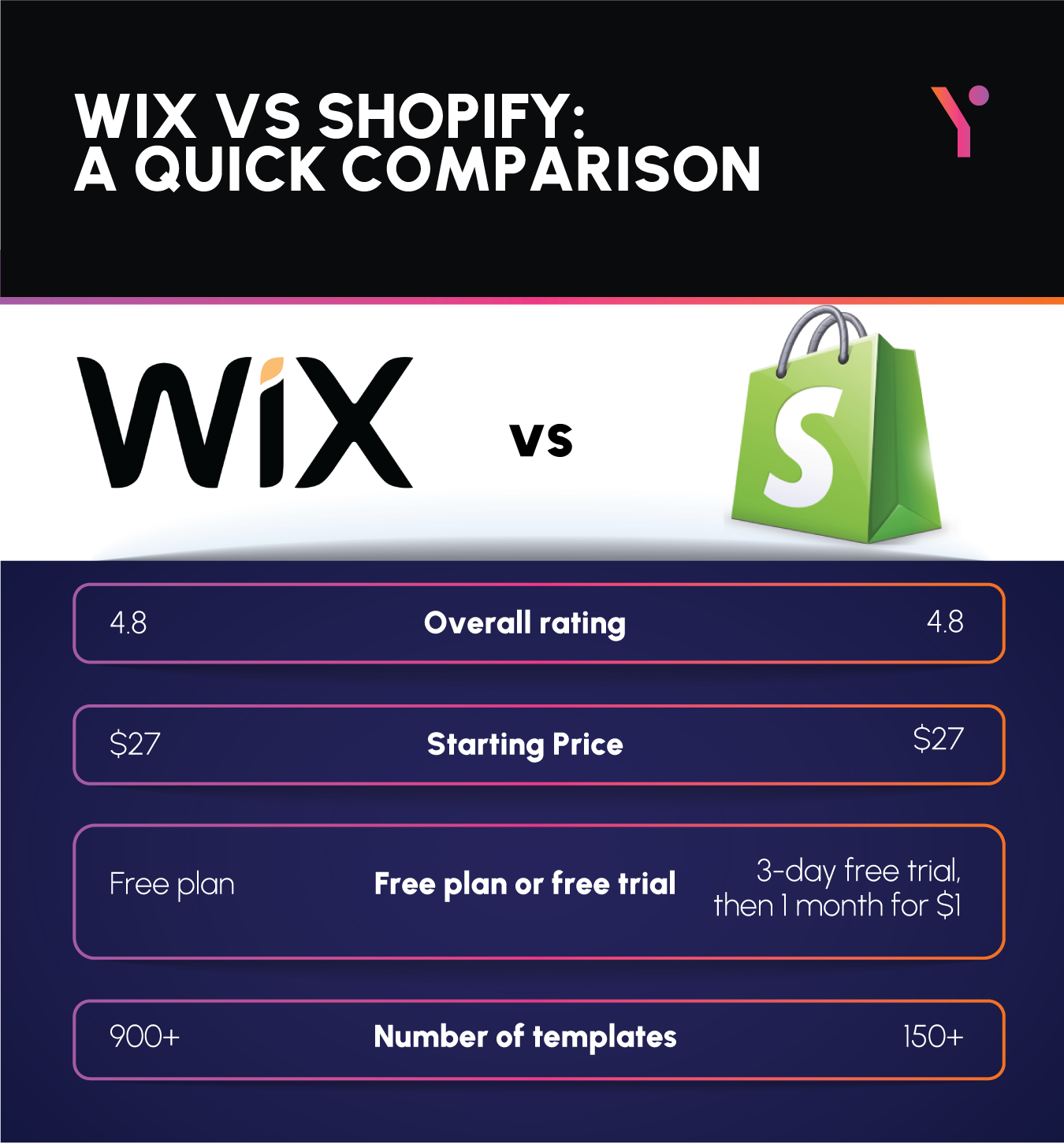Introduction
With the ecommerce market growing at an exponential rate, businesses are looking for the best platform to choose when looking to expand online. In this article we will discuss the top two platforms, Wix vs Shopify, their benefits for businesses and how each of these platforms fairs in different categories.
According to Statista, the global eCommerce market is set to reach $6,714 million, with an estimated 14 million users by 2029. With a market that is set to flourish and grow in the coming years, it is natural to see businesses from all industries moving towards ecommerce and selling online. This has paved the way for ecommerce platforms to capitalise and create an ecosystem for these businesses to grow. Out of these platforms, two standout as the giants in the industry, namely Wix and Shopify
In this article, we will be discussing the battle between Wix vs Shopify, what each platform has to offer and how businesses can benefit from using these platforms to further their online growth.
Wix vs Shopify: A Quick Comparision
Before we can do a deep dive into the functionalities and benefits each platform can offer, let’s look at a quick comparison of the two platforms and how they match up against each other in terms of pricing, rating and templates.

Wix vs Shopify: A Comprehensive Breakdown
Now that we have seen what both Wix and Shopify offer based on different aspects that business owners look for. This will be broken down into the following categories:
- Ease of Use
- Selling Online
- Business Promotion
- Template Options
While cost is a major factor for most business owners, the pricing of both of these platforms is relatively similar when it comes to upfront payment. The real costs arise when you are looking to hire individuals or that will be managing these platforms and other overhead costs that go into running a platform.Shopify store setup experts
Ease of Use
The first and foremost aspect that businesses look for when opting for an ecommerce platform is ease of use. This pertains to who can handle the platform and make changes as per requirement. This can either be someone in the company that has minimal training, or a best ecommerce developers. These factors impact the costs that businesses would need to incur.
Wix:
- Wix is renowned for its user-friendly drag-and-drop website builder, making it easy for beginners to create and customise their online stores.
- The platform offers a wide range of pre-designed templates and intuitive editing tools, allowing users to quickly build professional-looking websites without any coding skills.
- Wix provides step-by-step guidance throughout the website building process, making it simple to add products, customise layouts, and manage content.
Shopify:
- Shopify also offers a user-friendly interface with a straightforward setup process, although it may have a steeper learning curve compared to Wix for complete beginners.
- While Shopify’s interface is intuitive, it’s tailored more towards e-commerce functionality, which may be advantageous for users solely focused on selling products online.
- Shopify provides extensive documentation and support resources to help users navigate the platform and troubleshoot any issues.
Verdict – Ease of Use:For beginners looking to quickly set up a website without prior experience, Wix’s drag-and-drop interface and guided setup process make it the more user-friendly option. However, for users specifically focused on e-commerce functionality, Shopify’s tailored interface may offer more comprehensive tools and features.
Selling Online
It is absolutely vital for businesses that are choosing a platform to analyse its ability to sell online. This pertains to the functionality the platform offers, the customisation options and integrations that drive online sales.
Wix:
- Wix offers built-in e-commerce functionality, allowing users to sell products directly from their websites.
- The platform provides features such as customisable product galleries, secure payment options, and inventory management tools.
- While Wix’s e-commerce capabilities are robust, they may not be as extensive or specialised as Shopify’s dedicated e-commerce platform.
Shopify:
- Shopify is designed specifically for online selling, offering a comprehensive suite of e-commerce tools and features.
- The platform includes features such as customisable storefronts, secure checkout options, shipping and fulfilment integrations, and advanced analytics.
- Shopify also offers a wide range of apps and integrations to extend the platform’s functionality and cater to specific business needs.
Verdict – Selling Online:In terms of selling online, Shopify excels as a dedicated e-commerce platform with specialised features and integrations tailored for online businesses. While Wix offers e-commerce functionality, Shopify’s extensive toolkit and focus on online selling make it the preferred choice for businesses primarily focused on e-commerce. You might need the assistance of to gain maximum output.Shopify plus agencies
Business Promotion
Ecommerce platforms offer functionalities that are leveraged to promote your business. These can include tools for SEO, social media, email and other analytical tools that will help you improve your business and track performance.
Wix:
- Wix provides various built-in marketing tools and features to help businesses promote their websites and attract customers.
- The platform includes SEO tools, social media integration, email marketing, and analytics to help businesses optimise their online presence and reach their target audience.
- Wix’s App Market also offers additional marketing apps and integrations to further enhance promotional efforts.
Shopify:
- Shopify offers a range of marketing and promotional tools to help businesses drive traffic and sales.
- The platform includes features such as discount codes, abandoned cart recovery, SEO optimisation, social media integration, and email marketing.
- Shopify’s extensive app store also provides access to additional marketing apps and integrations to support various promotional strategies.
Verdict – Business Promotion:
Both Wix and Shopify offer robust marketing and promotional tools to help businesses attract customers and drive sales. However, Shopify’s specialised focus on e-commerce and comprehensive marketing features make it the preferred choice for businesses looking to maximise their online promotional efforts.
Template Options
Template options can be a deciding factor for certain businesses when it comes to picking a platform for your ecommerce venture. While this may not be the most important aspect, this is often seen as the tipping point and dictates whether the business owner will need a .web and application developer
Wix:
- Wix offers a vast selection of customisable templates for various industries and website types, including e-commerce stores.
- The platform provides visually appealing and modern templates that are fully customisable to suit individual preferences and branding.
- Wix’s drag-and-drop editor allows users to easily customise templates without any coding skills, providing flexibility in design options.
Shopify:
- Shopify also offers a wide range of professionally designed templates specifically tailored for online stores.
- The platform provides themes with built-in e-commerce functionality, including product galleries, checkout pages, and mobile responsiveness.
- While Shopify’s template selection may be more limited compared to Wix, the themes are highly optimised for e-commerce performance and offer advanced customisation options.
Verdict – Template Options:
Both Wix and Shopify offer a variety of professionally designed templates to create visually appealing websites. Wix’s extensive template library and flexible customisation options make it suitable for a wide range of businesses and website types. However, Shopify’s templates are specifically optimised for e-commerce functionality, making them the preferred choice for businesses focused on online selling.
Wix vs Shopify: The Final Verdict
While both platforms are head-to-head when it comes to performance and functionality in most regards, it all boils down to what your business needs. If you are just starting off with a minimum budget and want to create a visually appealing website for your limited product range, then Wix is easily the better option.
On the other hand, if you are looking to have a more comprehensive online store and have the budget to hire resources and providers to develop your online store, Shopify can be a great way to propel your business to new heights. It all boils down to requirements of the businesscustom web development service
Also Read:Hire Someone to build Shopify Store
Conclusion
Whether you go for Shopify or Wix, it is important to note that moving to an e-commerce platform can do wonders for your business. From streamlining processes, to targeting an entirely new audience that would otherwise be untapped without the help of an online store.
If you are looking to step into the world of ecommerce and want the best ecommerce developers, then FuturByte has got you covered. Our team consists of not only professionals in the ecommerce industry but also Wix and Shopify store setup experts that will take all your requirements into consideration and create an online store tailored to your business. Contact us today for a free consultation.
Frequently Asked Questions
Wix is primarily a website builder that offers e-commerce functionality as an option, while Shopify is specifically designed for e-commerce. Wix is more versatile for building various types of websites, while Shopify is focused on providing features specifically tailored to online stores.
Wix is generally considered more user-friendly for beginners due to its intuitive drag-and-drop interface and simpler setup process. Shopify, while still user-friendly, may have a steeper learning curve, especially for users who are new to e-commerce.
Yes, both platforms offer e-commerce capabilities, allowing you to sell products online. However, Shopify is specifically optimised for e-commerce and may offer more advanced features and integrations for online selling.
Both Wix and Shopify offer a range of customisation options, but Wix is often praised for its extensive library of templates and flexibility in design customisation. Shopify also provides customisation options, particularly through its themes and the use of apps and plugins.
Wix offers a range of pricing plans, including options for both regular websites and e-commerce stores. Shopify also offers multiple pricing plans, with specific plans tailored to different business needs. Generally, Shopify tends to be more expensive than Wix, especially for e-commerce features.
Both Wix and Shopify offer SEO tools and features to help optimise your website for search engines. However, some users argue that Shopify may have a slight edge in terms of SEO capabilities, particularly for e-commerce websites.
Have questions or feedback?
Get in touch with us and we‘l get back to you and help as soon as we can!




